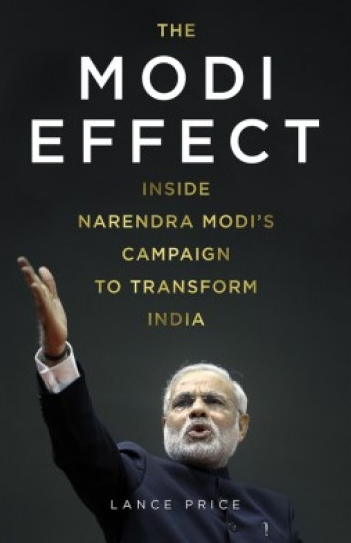Literature
Modi's religious beliefs helped shape his political views

Prime Minister Narendra Modi's religious beliefs helped shape his
political views and he has no desire to jettison Hindu nationalist
ideology, says a new book and notes that Modi risks alienating a section
of his supporters if he allows the more extreme elements of Hindutva to
influence governance.
The book, "The Modi effect: Inside
Narendra Modi's campaign to transform India" (Hodder&Stoughton; pp
352; 25 pounds (hardcover) 14.99 pounds (paperback) by British writer,
broadcaster and commentator Lance Price, says that Modi's success in
last year's Lok Sabha elections can be compared to that of landslides
secured by former British prime ministers Margaret Thatcher and Tony
Blair.
The book says that in Britain three leaders have secured
landslides since the Second World War: Clement Attlee, Margaret Thatcher
and Tony Blair.
"Their majorities in parliament were far larger
that Mr. Modi's in 2014, but while each left a permanent legacy behind
them, none was able to defy the swing of the political pendulum forever.
Indian politics is far more fragmented than Britain's; by winning as
convincingly as he (Modi) did, his success at the polls deserved to be
compared with theirs."
The book says that Modi, during his
campaign, offered the vision of a different kind of politics in which
choices are made on the basis of policies and values and not accidents
of birth or religion.
Price, a former BBC correspondent and a
former director of communications of the Labour Party, says that BJP may
not have been willing or able to resist the pull of uglier kind of
politics altogether but a large number of voters were evidently
attracted by the promise of a different way of doing things.
The
book says that for people who set a high store by the liberal values of
free expression, diversity and religious tolerance, the Modi campaign
and the first few months of his government produced ample grounds of
concern.
"Tony Blair, for whom I worked, was a devout Christian
but whenever the teachings of the church came into conflict with the
policies he believed to be right, he followed his own political
instincts and not the dictates of his religion."
"And yes,
Narendra Modi's religious beliefs clearly do help to shape his political
views. But to judge from the first 10 months, there has been no
evidence since he became prime minister of any impact on policy that is
remotely comparable, for example, to the damaging influence of
fundamental Christianity on the administration of President George W.
Bush," the book says.
Modi assumed office last May after leading his Bharatiya Janata Party (BJP) to its first full-majority victory.
The
book, released Saturday, looks at Modi's rise to power, his mass appeal
despite the controversies surrounding him and the role he will play on
the international stage. Based on "exclusive access" to Modi, his
ministers and advisers, it tells the inside story of his much
talked-about campaign for the Lok Sabha elections.
Price says
that if Modi was to completely jettison the Hindu nationalist ideology
that he grew up with he wouldn't last very long.
"He would not do
that and as far as I can tell, he has no desire to. But if allows the
more extreme elements of Hindutva to influence the way he governs to any
significant degree then he risks alienating those who believe that his
commitment to build a modern India reflects real Modi," the book says.
It says that Modi has set a very high bar for himself and for the country.
"If
he can continue to keep his more fundamentalist supporters in check and
if he is able to demonstrate that India's future economic and social
development can be advanced both quickly and fairly, without putting the
interests of any one community over another, he would have achieved a
great deal."
The book says Modi has, time and again, demonstrated a will to succeed that has overcome all the hurdles placed in his path.
"In
his long career he has been demonised, shunned, dismissed and
condemned. But perhaps the biggest mistake his enemies have made is to
underestimate him. He has now earned a place in history," says the book.





































